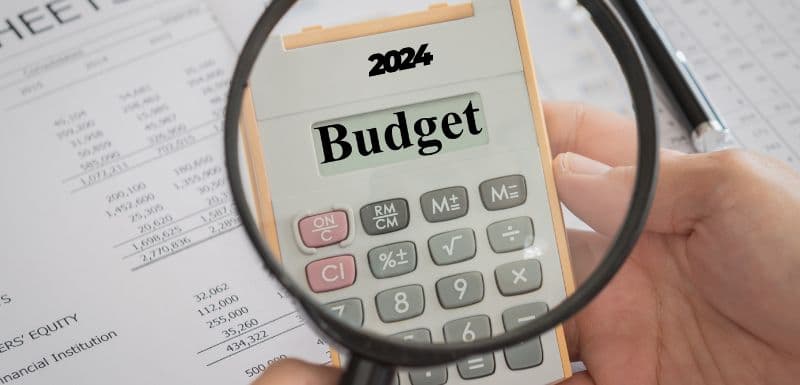Budget 2024: What to Expect – Tax Exemptions, Deductions, Change in Slabs or Status Quo?

With the new Government in place and the continuation of Nirmala Sitharaman as the Finance Minister, the Union Budget is expected to be presented in July 2024. The expectations from the Finance Minister are running high from all sections of taxpayers. In this article, we will look at what can a common man expect from the budget.
Budget 2024 Expectations
The Finance Minister has to do a fine act of balancing the expectations of various stakeholders. She has to balance between investing in infrastructure and spending money to boost consumption, managing the expectations of individuals and corporates, raising revenue by taxing some industries and giving tax sops to some, etc. Considering the high inflation levels, it is expected that the Government could consider income tax relief for the people in the lowest tax slab in the 2024-25 budget.
Some of the budget expectations of the common man include the following.
1) Increase in Basic Exemption Limit and Tax Slabs
Under the new tax regime, the basic exemption limit is for taxable income up to Rs. 3,00,000 for the Financial Year (FY) 2024-25. The common expects the basic exemption limit to be increased to Rs. 5,00,000.
The common man expects the 5% tax slab to be raised to Rs. 5 to Rs. 10 Lakhs. Similarly, there is an expectation that the 10%, 15%, 20%, and 30% tax slabs will also be raised.
2) Increase in the Standard Deduction
The current standard deduction allowed is Rs. 50,000, which was fixed in 2019. Since then, the cost of living has increased significantly. Hence, the common man expects the standard deduction to be increased from Rs. 50,000 to Rs. 1,00,000.
3) Increase in Section 80C Limit
An individual can avail of a deduction for specified investments and payments under Section 80C of the IT Act. The maximum deduction allowed is the amount invested/paid or Rs. 1,50,000, whichever is lower. The limit was last raised in 2014 from Rs. 1,00,000 to Rs. 1,50,000. In the last ten years, the Cost of Inflation Index (CII) has increased from 240 to 363, a more than 50% increase.
Hence, the common man expects the Section 80C limit to be increased to Rs. 2,50,000. Also, the Section 80C deduction is available only under the old tax regime. It must be extended to the new tax regime, if not in its entirety, then at least for some of its components.
4) Separate Deduction for Term Insurance Premium
In India, the percentage of life insurance penetration is lower in single digits. Life insurance is a critical component of the financial planning process. When an individual is alive, they will make all efforts to pay financial liabilities (home loan and other loans) and fulfill financial responsibilities (a child’s higher education and marriage, own and spouse’s retirement, etc.).
However, what happens to these financial liabilities and responsibilities if an individual dies early? In such a scenario, a term life insurance plan can be a family’s financial backup. Hence, the common man expects the Finance Minister to provide a separate deduction for term life insurance premium under the old and new tax regime. The deduction can be provided for a limit of up to Rs. 50,000 to Rs. 1,00,000.
Currently, the deduction for life insurance premium is a part of Section 80C. Also, the deduction can be availed only under the old tax regime. A separate deduction for term insurance in the old and new tax regime will increase the penetration of life insurance in the country.
5) Increase in Section 80D Limit
An individual can avail of a deduction for health insurance premium under Section 80D of the IT Act. The maximum deduction allowed is the premium paid or Rs. 25,000, whichever is lower, for the family (includes self, spouse and dependent children). If the individual is a senior citizen, the maximum deduction allowed is Rs. 50,000. An individual can avail of a separate deduction for parents.
In the last few years, health insurance premiums have increased at a faster pace. With higher health insurance cover requirements and higher premiums, many individuals exhaust the deduction limit allowed.
The common man expects the deduction limit to be raised from Rs. 25,000 to Rs. 50,000 in Budget 2024. Similarly, the expectation is the limit be raised for senior citizens from Rs. 50,000 to Rs. 75,000 or Rs. 1 lakh.
The Section 80D deduction for health insurance premium is applicable only under the old tax regime. Health insurance being a necessity, the common man expects the health insurance premium deduction to be made available under the old and new tax regime.
6) Provide Deductions for Retirement Planning
Individuals have to do their own retirement planning as there is no formal social security benefit from the Government. The retirement benefits from the employer like Employee Provident Fund (EPF), gratuity, leave encashment, etc., may not be sufficient to fund the entire retirement.
Hence, the Finance Minister should provide deductions for contributing towards the National Pension Scheme (NPS) under the new tax regime. Also, the limits should be higher than the existing limits of Rs. 1,50,000 under Section 80CCD(1) and Rs. 50,000 under Section 80CCD(1B).
Will the Finance Minister Provide Tax Benefits to Boost Consumption?
In the last couple of years, high inflation and high interest rates have led to lower savings and impacted spending. Hence, tax benefit(s) from the Finance Minister in the form of an increase in basic exemption limit, wider tax slabs, increase in standard deduction, increase in other deductions like Section 80C or 80D, etc., will leave more money in the pockets of consumers.
Higher savings will enable higher spending by individuals, which in turn will boost consumption. It will lead to higher demand for goods and services in the economy and higher order inflows for companies. Higher consumption and industrial activity will boost the country’s overall economic growth.
However, the Finance Minister will have to forego revenue to provide tax benefits to the common man. With an aim to lower the fiscal deficit and increase social spending, it remains to be seen how much tax relief can the Finance Minister provide to the common man and in what form.
What does the Budget mean for Long Term Investors
The Union Budget is an annual exercise by the government, that is focused on the revenue and expenditure estimates or provisions for the new fiscal year. It often creates the path for the government's capital or social outlays. It also makes adequate provisions and policies for revenue to fund government outlays in various sectors. For an individual, the most critical aspects in a budget that could affect household finances are of personal tax provisions including income tax rates or deductions, capital gains rules on investments and any new avenue of investing that could help in creating social security or tax saving.
The Budget is simply an event in the long term journey of an investor focused on achieving their goals. While it may cause short term market fluctuations, long term investors who are focused on goals would look at this as a temporary market event. By maintaining a disciplined approach and sticking to their investment plan, investors can navigate the budget volatality without deviating from their long term objectives. It is essential to remember that the budget's impact is fleeting, but a well planned investment strategy ensures lasting success.
Your Investing Experts
Relevant Articles
Difference Between Sensex and Nifty: A Simple, Clear Explanation
When people talk about the Indian stock market, two names appear everywhere: Sensex and Nifty. They are the most widely tracked market indices in the country. Yet many investors still look for a clear explanation of the Sensex and Nifty difference, how each is calculated, and what companies form part of these indices.
Understanding Foreign Institutional Investors (FIIs) and Their Role in the Indian Stock Market
Foreign Institutional Investors (FIIs) are among the biggest movers of the Indian stock market. Their buying or selling patterns often set the tone for market sentiment, liquidity, and long-term growth, making them vital to understanding how global money shapes India’s financial ecosystem.
Election Results Shock Markets: Does Asset Allocation Make Sense in Times Like These?
On 4th June 2024, the stock markets fell sharply in response to the election results. While the markets recovered over the next few sessions, days like these emphasise the importance building a diversified portfolio. In this article, we will discuss what is asset allocation, the types of asset classes and their role, and how having a diversified investment portfolio can give better risk-adjusted returns.


.png)
